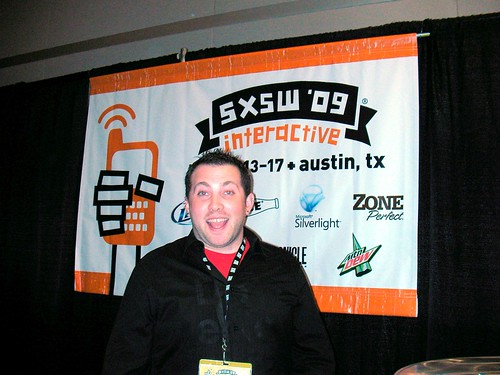SXSWi 2009: Working Alone Sucks: Join the Coworking Revolution
Alex Hillman co-founder, Indy Hall
Coworking: A place to work and share ideas. It’s nice to have an office so there is separation between work and home. Community power and shared office space. It’s slightly different to everyone else.
Brad Newberg was working out of his home, so he got some people together to work together. Started a Google Group for Coworking. He open sourced the idea.
Jelly communities and coworking. Jelly was started in NY. I have flexibility where I work, but I like working with other people. Jelly beans, multi-colored group all together. Ad hoc get togethers. The natural pre-cursor to a formal coworking space.
One of the reasons that coworking works is the notion of a clubhouse. If you move it around, then people become people of habit.
The Google Group is the best resource for this community.
When I’m coworking, I do kind of lose productivity. You have to let the land sit fallow for a while, coworking is like that.
There are distractions. Productivity can drop. It’s a product of how often you deal with it. At home you deal with distractions as well (wash dishes, walk the dog, etc.). A good coworking space may distract you, but they are a sub-channel of productivity. It has more value to your work day than taking the dog out to walk the dog.
The traditional model is the 9-5 with micro-managed time. A lot of people realized that there are a lot of downsides to working at home. Cowork provides a venue that is somewhere between home and the office. You need to create an office environment that feels like a home.
ROWE: Results Oriented Work Environment
Accelerating Serendipity is the other benefit of coworking.
Coworking is about building authentic relationships. Whether you do that at the desk, at the dartboard or at the Wii is a method of building those relationships.
Collaborate or DIE.
We are creating a sustainable professional community.
This is a movement that is our only choice in the business community. Otherwise, we’ll end up like GM, or the banks.
Books: The Starfish and the Spider (decentralized organizations), Cluetrain Manifesto
Money: Two paths
Develop the space and work with communities and bring in people.
Gangplank in Phoenix, AZ runs on the Sugardaddy Model: Having access to really smart people never hurts. We’ve been able to hire people from this. We are able to get jobs from it.
Are there any templates for getting a coworking place started? All of the templates are on the Wiki… somewhere… wiki.coworking.info
How do you talk about this without freaking people out? People feel like we’re a bunch of commies.
Not everyone who is doing this, not everyone is succeeding. Alot of them are struggling.
Meeting other smart people helps you grow professionally.
Great incubator idea that distributes software online and distributes the money to each person who worked on the project at a pre-determined ratio.
Look for things that are going to happen anyway and try to make them happen easier and faster.
Once a coworking company “graduates” they stay in the community to be alumnis to be mentors to the younger generation.
Real estate companies have a ton of unused space. Contact the city revitalization people. Corporations with unused space have unused space. Security and culture are the two biggest challenges with these situations.
How do you structure your business? LLC is an agility issue. NonProfits are SLOW. We want to effect change quickly. Benevolent dictatorship. It provides us with the ability to make decisions.
Eventually, the idea of big companies having big spaces will be lost.
Where is coworking going? The connectivity makes us a more self-aware universe. I can travel to any city in the world and know someone who is there.

